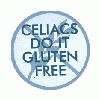
Lisa
-
Posts
8,691 -
Joined
-
Last visited
-
Days Won
15
Lisa's Achievements
-
-
Thank you so much for posting this. I have book marked this and will share it with everyone I possibly can. Just curious as to whether it would be useful/prudent for many of us to forward our medical records to the good doctor in interest of increasing his data base for research purposes. Any thoughts on this?
CS
Well, you could contact the Columbia Celiac Disease Center and inquire.
-
It has always been my understanding that any imported product must comply with US regulatory law, which would include the listing of wheat if an ingredient.
Granted, corruption is prevalent in Asian countries. You can only arm yourself with information and make the best choice available. If a foreign product makes you ill, don't go there again.
-
What I'm concerned about is that the patch is made to deliver nicotine through the skin barrier into the blood stream. If there is gluten in the adhesive, it would also be able to pass through the skin barrier into the blood stream depending on the carrier used for the nicotine.
No, that's not possible. The gluten molecules are to large to penetrate the skin barrier. And, I think it doubtful that it would contain gluten anyway. Good luck with your quest. I quit smoking over two years ago, after 30 years.
-
Yes, I too. That's another reason why THIS forum is so important. It's so important to many of us that accurate information and research is available to those in need.
-
Does anyone know if the nicoderm CQ (quit smoking patches) are gluten free?
I quit smoking yesterday and am using the patch. I can't find anything online.
Thanks
Jennifer
Gluten free or not, it should not bother you unless you have an allergy to topical products.
-
For anyone who has Celiac Disease or knows someone who does, this is a must read, whether newly diagnosed or and old veteran:
Open Original Shared Link
THIS IS ONE OF THE BEST ARTICLE THAT I HAVE SEEN IN A LONG TIME. Please take the time to read this.
-
Here is some Florida information:
Open Original Shared Link
As you know, lists change without warning. So, it's always good to depend on your label reading skills. But, if you needs lists, I would recommend Cecelia's Market Place Grocery Guide. New books are issued yearly.
-
It's articles like this that confuse people. Here they say celiac is an allergy. I know it's not. But when someone does a search on celiac disease and this comes up...well what is one to think. My brother in law has severe psoriasis...and psoratic arthritis. I have been trying to convince him to go gluten free...as well as dairy to see if it helps him. He has the big D often and just thought it was the psoriasis effecting his intestines or something. Well, he was at his dermatologist about a week ago and inquired about it. Asked what he thought and the derm said flat out and sort of angryish...that celiac is not an autoimmune disorder and that my BIL did not have celiac. So BIL comes home believing this guy...ugh. It's people like that and articles like the one I'm posting that make people not know what to believe.
Open Original Shared Link
CC
That article certainly does add to the confusion.
-
I think he's more confused than I am!!
I believe you are correct! This is a great place and feel free to ask away!

-
The research organizations recommend the equivalent of 3-4 slices of bread daily, up to six to eight weeks.
Why not just have your son tested?
-
Hi and welcome!
So many foods are naturally gluten free. There is no need to feel deprived these days. In your dad's case I would recommend buying Cecelia's Gluten Free Grocery Shopping Guide. It lists over 30,000 main stream products. It can be very helpful in the beginning days of the diet, when everything is overwhelming.
After some time, your dad should be able to read labels and no lists will be necessary.
Tell Dad to eat simple with meats, seafood, rice, potatoes, fresh veggies and fruit....all of which are naturally gluten free.
Check out the product section of this forum - it will be a great help.
www.CeceliasMarketplace.com
www.triumphdining.com
-
Here is some information regarding allergies vs food intolerances:
https://www.celiac.com/articles/21847/1/Qui...ance/Page1.html
Open Original Shared Link
Why is it important to know if you have celiac disease, versus wheat allergy or gluten intolerance?
Celiac disease, wheat allergy and gluten-intolerance are treated similarly, in that patients with these conditions must remove wheat from their diet. It is important to note, however, that there is a difference between these three medical problems. Celiac disease is an autoimmune condition, where the body’s immune system starts attacking normal tissue, such as intestinal tissue, in response to eating gluten. Because of this, people with celiac disease are at risk for malabsorption of food in the GI tract, causing nutritional deficiencies. This can lead to conditions such as iron deficiency anemia and osteoporosis. Since a person with wheat allergy or gluten-intolerance usually does not have severe intestinal damage, he or she is not at risk for these nutritional deficiencies. Celiac disease is an autoimmune condition, putting the patient at risk for other autoimmune conditions, such as thyroid disease, type I diabetes, joint diseases and liver diseases. Since wheat allergy and gluten intolerance arenot autoimmune conditions, people who have food allergies and intolerances arenot at increased risk to develop an autoimmune condition over the general population’s risk. And finally, celiac disease involves the activation of a particular type of white blood cell, the T lymphocyte, as well as other parts of the immune system. Because of this, patients with celiac disease are at increased risk to develop GI cancers, in particular lymphomas. Because food allergies and intolerances do not involve this particular immune system pathway, and do not cause severe GI tract damage, these patients are not at increased risk for these cancers.
Thus, while celiac disease, wheat allergy, and gluten-intolerance may be treated with similar diets, they are not the same conditions. It is very important for a person to know which condition they have, as the person with celiac disease needs to monitor himself or herself for nutritional deficiencies, other autoimmune diseases, and GI cancers. In general, the symptoms from food allergies and intolerances resolve when the offending foods are removed from the diet and do not cause permanent organ damage.
Celiac Disease is an autoimmune disorder that manifests itself in the small intestines. Gluten Ataxia can effect other parts of the body and Dermatitis Herpetaformus can effect the skin.
Gluten intolerance and Celiac are often used interchangeably on this site unfortunately.
Although an intolerance/sensitivity can have a spectrum of levels, the two are quite different. Yet, they are similar in the RX.
If you have been diagnosed with Celiac Disease, you must comply with a zero tolerance diet. It is not the amount of gluten that you consume, but the autoimmune response to the smallest amount of gluten, which will do damage to your body.
It is hard to take it all in in the beginning, that's why is Board is so essential. It's the best information you will find anywhere.
Hope this helps.
-
you're right! But obviosuly if i get that seared steak id still have to inform the waiter of my allergy

Excuse yourself before orders are taken and talk to the manager about your options. Return to the table and order accordingly.
-
i'LL BE BACK TONIGHT AFTER i COOK DINNER........RATS
Is that what they eat in California Judy?

....welcome back.
-
Mcneil Consumer Healthcare Announces A Voluntary Nationwide Recall Of All Lots Of Tylenol
-
i'm sorry i forgot to state the source!
one website is:
Open Original Shared Link
I believe there is more current, more reliable information out there.
Open Original Shared Link
You might find this interesting:
Specific Enzymes Produced by the Body to Aid Digestion
Our bodies produce numerous digestive enzymes. The following are enzymes and their actions:
* Amylase for carbohydrate digestion or breakdown into simple sugars
* Protease for large chain protein molecules to make smaller protein molecules
* Peptidase for small protein molecules to make amino acids
* Lipase for fat (triglycerides) breakdown
* Lactase for milk sugar (lactose) breakdown
* Cellulase for breaking down the fibrous plant matter cellulose
* Maltase for the breakdown of malt sugar
* Invertase for the breakdown of sucrose (table sugar)
* Chymotrypsin for large protein chains
* Trypsin for large protein chains
* Pancreatin for the breakdown of protein, carbohydrate, and fats
* The enzymes that have affect protein molecules are proteolytic enzymes.
Digestive Enzyme Supplements
Digestive enzymes are sourced commercially from animal or plants/fungi. The fermentation of various fungi produces the enzymes amylase, protease, peptidase, lipase, lactase, and cellulase. During production of digestive enzymes, microbial filtration ensures there is no fungal residue. Chymotrypsin, trypsin, and pancreatin are pancreatic enzymes, which are from animal products.
Plant based supplements are more stable and able to survive a greater pH than animal based or pancreatic enzymes. Gastric acid tends to destroy animal derived enzymes more easily than plant based enzymes. Some manufacturers, with the use of enteric-coated enzyme supplements, have overcome this problem. Enteric coating is a coating which inhibits the product from dissolving in the stomach. It dissolves in the intestine where there is less stomach acid. This may affect the clinical use of the product; however, as the enzyme supplement will not be effective for the stomach or upper small intestine. Additionally, plant-based digestive enzymes have a broader range of digestive enzyme activity.
Digestive Enzymes Health Benefits: Aid Digestion and Reduce Food Allergies
The main health benefit of general digestive enzyme supplements is in the support of the digestive process. A human and animal study found both fungal and pancreatic enzymes improved malabsorption and malnutrition, while producing a healthier stool weight and fat excretion. Theoretically, digestive enzymes can also work by breaking down dietary proteins that enter the bloodstream due to inflammatory conditions or a breakdown in the gut mucosa barrier. When these proteins travel from the gut to the bloodstream inappropriately, they can cause an immune reaction such as food allergies. Digestive enzymes may reduce this allergic reaction by breaking down these proteins and reducing an immune response.
Read more at Suite101: The Health Benefits of Digestive Enzymes: Enzyme Supplements Aid Digestion and Food Allergies Open Original Shared Link
-
Yummy! Thanks Beth, this sounds great for New Years.
-
When I initially took digestive enzymes (early into my gluten free diet) I could not handle it. I gave it up for a while and discovered one without dairy and I handled it quite well.
Many people highly recommend them.
-
I’ve been reading about how digestive enzymes are manufactured, and my big question is wether or not celiacs should take enzymes. The answer could be yes, no, or SOME (which is what i suspect the answer is).
In the U.S., every enzyme company gets their enzymes from 3 source distributors, all of which use gluten-containing cereal grains and a form of mold/fungus like aspergillus orzae or aspergillus niger in the production of some digestive enzymes. the fungal organism is placed on trays of fermenting stuff that most always includes grains, they secrete enzymes, and then the whole mixture is put through a separation process which usually involves some of the following (none of which i understand): alcohol precipitation of the enzyme proteins, centrifugation, gel filtration, molecular sieving. So, there are many fungi-grain enzymes and I believe these are known as “plant-based”. But there are also some fruit-based enzymes extracted straight from food, and some animal-based enzymes like from the pancreas of pigs. At some point in the process MALTODEXTRIN is used when deriving and stabilizing the enzymes. This contains gluten and many celiacs react to it. Companies don’t have to include it on their ingredients lists because it’s not an “additive,” it’s just part of the process of deriving the enzymes. But some maltodextrin probably ends up being part of the enzyme matrix. ALL the raw enzymes distributors in the U.S. use maltodextrin in the process of obtaining MICROBIALLY-DERIVED enzymes.
The enzyme producers adhere to strict extraction guidelines and claim that none of the mold or grain is left in the finished product. But is a fact that people with a mold allergy react negatively to the “plant-based” enzymes including phytase and alpha-galactosidase made from aspergillus niger, so I don’t know if I believe the companies’ claims that none of it remains. There could, however, be some other thing happening in those people’s bodies when they take the enzymes such as a cross reaction with the enzyme itself if their immune systems have somehow associated the enzyme protein with the mold it came from. I don’t know.
This all leads me to suspect that a very sensitive celiac (me) who reacts to the slightest amount of gluten, including maltodextrin, might not be safe taking enzymes that were produced on and in big vats of gluten, then processed using maltodextrin.
So... zyme
Is there a chance that any part of the grains is in the enzymes, either because it could still remain after the extraction process or because the enzymes themselves might have some component of the grain somehow?
Would it be safer to only take fruit and animal-derived enzymes, or would they have just as likely a chance of containing grain stuffs?
Let me know your opinion, and feel free to forward to any enzyme experts you might know. Thank you so much!!
Would you kindly state your source. The bolded (by me) statement is untrue and I have serious concerns about the remaining statements.
-
. I had positive test results on my IgG and IgA tests oscopy.
You have found your answer, now find a new doctor.

A positive serologic panel is considered a diagnosis. Sometimes and endo/biopsy can support that conclusion, but not always because effected areas can be missed.
Welcome to the Club!
-
Hi I am new to all of this (diagnosed with ceoliac disease Mid Dec).
Can anyone help me and tell me if these are suitable for us to eat or not.......................

Do you have the ingredient listing available? Can you list it?
-
Dairy is often recommended to eliminate for a time. It can later be reintroduced.
Keep a food diary.
Depending on the amount of damage you have and dedication to the diet, will determine your healing time. Sometimes full healing can take up to two years.
-
DIVINE Indeed! That's on my list of wonderful things to try.
-
It looks like Nathan's hot dogs (the ones you buy in supermarkets) are now gluten-free, as of December 2009. See my post here:
https://www.celiac.com/gluten-free/index.php?showtopic=64885
No idea if the hot dogs served at the Nathans restaurants are gluten-free too...if anyone wants to check, maybe they could post something here as a followup.
(sorry to resurrect the zombie thread...it's just that this is the first thing that comes up in a search for "nathan's gluten free", so I figured I'd add a note, in case anyone is looking to see if Nathan's is gluten-free).
AND canadave, thanks for the note. That's one of the many reasons why we are here.







Against The Grain - David J. Craig/columbia Magazine
in Publications & Publicity
Posted
I don't know where you live but, the Celiac Center at Beth Israel Deaconess Medical Center in Boston, MA is enrolling participants in a study to evaluate the type of symptoms that occur in celiac disease and to look at how living with Celiac Disease affects peoples lives.
You can contact them at:
celiac@bidmc.harvard.edu